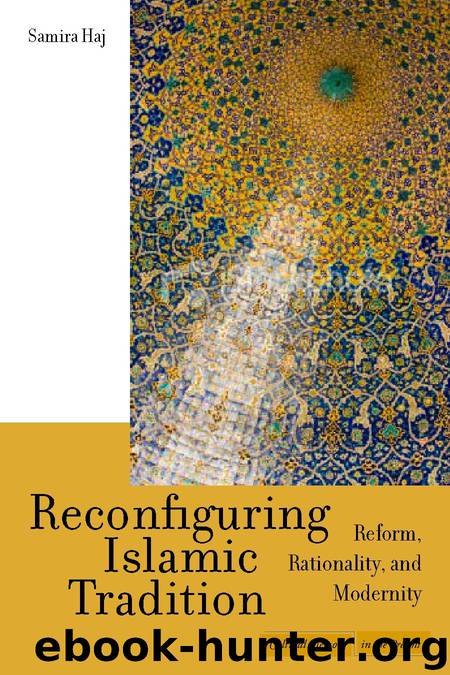Reconfiguring Islamic Tradition by Haj Samira

Author:Haj, Samira
Language: eng
Format: epub
Publisher: Stanford University Press
Published: 2011-07-27T16:00:00+00:00
Instituting Reform Through Fatawa
Between 1899 and 1905, ‘Abduh held the position of grand mufti of Egypt, which allowed him to put into practice his vision of a reformed Muslim world.91 During his six years as grand mufti, ‘Abduh delivered close to a thousand fatawi, the vast majority of which addressed matters relating to routine monetary transactions and did not represent significant departures from existing legal thought.92 In some of these opinions, however, ‘Abduh addressed questions and concerns arising from the social and economic restructuring of Muslim societies in general and Egypt in particular. In what follows, I take representative samples from his fatawi that exemplify his attempt to define new standards for Islamic social norms and mores that would accommodate the needs in the modern context without violating the boundaries set by the Islamic tradition.
In 1899, ‘Abduh delivered a fatwa addressing the role of government intervention in regulating the economy from an Islamic legal perspective. The opinion he delivered favored state intervention in order to create symmetry between competing interests and as the best way to safeguard public interest. ‘Abduh justified government action on the basis of maslaha ‘amma, an Islamic legal notion that endorses public welfare and shuns possessive individualistic interest. This fatwa was triggered by the first general labor strike in Egypt, which was initiated by the cigarette workers (30,000) and spilled over to other subsidiary and manufacturing industries in support of the cigarette workers’ demands for better wages, working conditions, and the right to unionize. The strike lasted over three months, beginning in December 1899 and ending on February 21, 1900. The length of the strike set off intense public debate over what became the two major, and polarized, positions: one, led by Lord Cromer, the British administrator of Egypt, advocating free enterprise and nonintervention; the other, led by ‘Abduh’s intellectual nemesis, Farah Antun, advocating state intervention and a welfare state system. Cromer’s opinion represented the official position of the British colonial administration and was published in the pro-British newspaper al-Muqatam. Cromer defended laissez-faire and government neutrality by claiming that “the role of the state is to secure order and protect free industry and free labor . . . [indicating that the] government arbitrates only when conflicting sides agree to that.”93 Antun criticized the nonintervention of the colonial administration by maintaining that “free enterprise” was a screen for government protection of the interests of the capitalists and the powerful, and that when Cromer spoke of the government maintaining security and order, what he really meant was securing the order of the rich for the rich.94 More significantly, Antun questioned whether capitalist free enterprise and the sacrosanct principle of “individualism” were even appropriate for weaker colonized economies such as that of Egypt.
In turn, the strike became the platform from which various political and national factions (both Islamic and secular) debated the uses and abuses of colonialism on Egyptian society and economy. Other leaders joined Antun’s interrogation of British colonial authority and its wisdom in enforcing laissez-faire capitalism on
Download
This site does not store any files on its server. We only index and link to content provided by other sites. Please contact the content providers to delete copyright contents if any and email us, we'll remove relevant links or contents immediately.
The History of Jihad: From Muhammad to ISIS by Spencer Robert(2628)
Nine Parts of Desire by Geraldine Brooks(2369)
The Turkish Psychedelic Explosion by Daniel Spicer(2357)
The First Muslim The Story of Muhammad by Lesley Hazleton(2271)
The Essential Rumi by Coleman Barks(2046)
1453 by Roger Crowley(2031)
The Last Mughal by William Dalrymple(1858)
Trickster Travels: A Sixteenth-Century Muslim Between Worlds by Davis Natalie Zemon(1847)
Muhammad: His Life Based on the Earliest Sources by Martin Lings(1646)
God by Aslan Reza(1643)
by Christianity & Islam(1633)
A Concise History of Sunnis and Shi'is by John McHugo(1567)
No God But God by Reza Aslan(1545)
Magic and Divination in Early Islam by Emilie Savage-Smith;(1534)
The Flight of the Intellectuals by Berman Paul(1503)
Nothing to Envy by Barbara Demick(1450)
Art of Betrayal by Gordon Corera(1431)
What the Qur'an Meant by Garry Wills(1394)
Getting Jesus Right: How Muslims Get Jesus and Islam Wrong by James A Beverley & Craig A Evans(1342)
